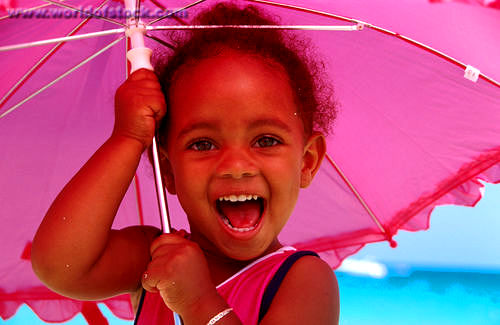The Psychology of Happiness
Published on June 10, 2011 at 2:30 PM by FACE OF MALAWI

“Let’s all go around the circle and take turns telling everyone what makes us happy,” our third-grade teacher said as she stood before the class, looking svelte and resplendent in the kind of paisley minidress that was big at the time. Even from my presexual, nerd-girl vantage point, I understood that she herself was happy and that this, of course, was why she had chosen the exercise. The class across the hall, led by a gloomy teacher in a burnt orange crocheted shawl, would never have been instructed to go around the circle and proclaim the particulars of their joy. They might, instead, have been coaxed into a heated discussion of Incan farming, but that was about it. Our teacher was happy, truly happy, and like most happy people, she wanted everyone to know it.
One by one the kids in our class said that snow days made them happy; getting presents made them happy; doing nice things for other people made them (supposedly) happy; Carvel made them happy. When it was my turn, I believe I volunteered that my dachshund made me happy. And, finally, when it was our teacher’s turn, she pronounced that we, her students, made her happy, though of course we knew better.
Her happiness, we were certain, had nothing to do with us. She was in love—and someone loved her back. This was the source of her not-so-secret hidden happiness, and it served as an engine that roared her through every single school day.
Happiness, it seems to me here in the middle of my life, long after my dachshund has gone, and long after snow days have ceased to have much relevance, and even after most presents have stopped mattering to me, is a slippery thing. The nature of it changes as quickly as our own lives do.
For years—a period that stretched from high school through college and then deep into the murk of my 20s—my friends and I were intensely aware of all our feeling-states and desires, whether good or bad. Several of us went to the same therapist, whose name was Martha, and her office had a cocktail party–with-a-turnstile quality to it. “Oh hey, how are you, Meg?” someone might say on her way out. “Great shoes.” Personal happiness was something we deliberately strove for, often in the form of men, women, a first big professional success, or a cheap walk-up apartment, though of course we were often beset by dramatic sorrow (cue Martha). This period of flux went on for a long time. Life was peppered with love and excitement and tears, and my friends and I had learned to be human barometers for our own happiness.
But then time sped forward, and while the actual catalysts for happiness continued to change, a strange thing happened: Happiness seemed less relevant as a goal, and things seemed less awful when it didn’t appear. And now the truth is that at this particular moment in my life, I no longer think in terms of “happy” and “unhappy,” the way I did when I was in third grade, or as a young woman in my own era’s version of a paisley minidress. It’s not only that I’ve aged but that the world has, too.
Everyone talks incessantly about stress now, and how it has changed our lives and made us so unhappy. Less obviously, I think stress has also changed the quest for happiness itself, making it more aggressive and occupying more of our time. Ever since antidepressants and sexual-enhancement drugs hit the airwaves and ever since we were told that we had a right to our happiness, damn it, and that we could ask for it—no, demand it—from our doctors, spouses, friends, or employers, it seems that the desire for happiness has increasingly become a source of anxiety.
Which is why I have taken a few steps back.
At this point, being happy is about having the space to appreciate the ordinary things that do in fact make me “happy,” though at first glance they might not be seen that way. An absence of chaos; an absence of phone calls with disturbing news; an absence of business e-mails that upend your day and demand attention right then and there; no acutely ill parents; no fragile children calling shakily from college. Being able to sit down with a glass of wine and some really good, tiny little olives with your husband; having a nice meal with your kids that’s not rushed or fraught. These seem like small things, perhaps like pedestrian things, but I protect them fiercely, knowing that on the other side of an imaginary wall waits the possibility that all of them will soon be gone, and that something terrible will replace them.
But I no longer quake in fear. I used to think that happiness was something a person was so lucky to find that, like Lord Voldemort (a.k.a. He Who Must Not Be Named), it should never actually be mentioned. Now, with happiness taking on a new, modest cast, the fear of losing it is smaller, too.
You might think: Good God, woman! This isn’t happiness. Happiness has wild colors and flavors; it involves bodies draped across a bed, or things that come in gift wrap. Or even, once in a while, Carvel. Don’t you want any of that?
Of course I do. But being allowed to enjoy some of the more modest pieces of my life happens right now to be my own personal Carvel; my own dachshund, gift-wrapped present, snow day, and secret lover. Perhaps for most of us—or anyway at least for me—happiness has gotten smaller over time, becoming endlessly and exquisitely refined, though somehow never diminished.
Meg Wolitzer’s new novel, The Uncoupling, will be published in April. Her previous books include The Wife, The Position, and The Ten-Year Nap.


